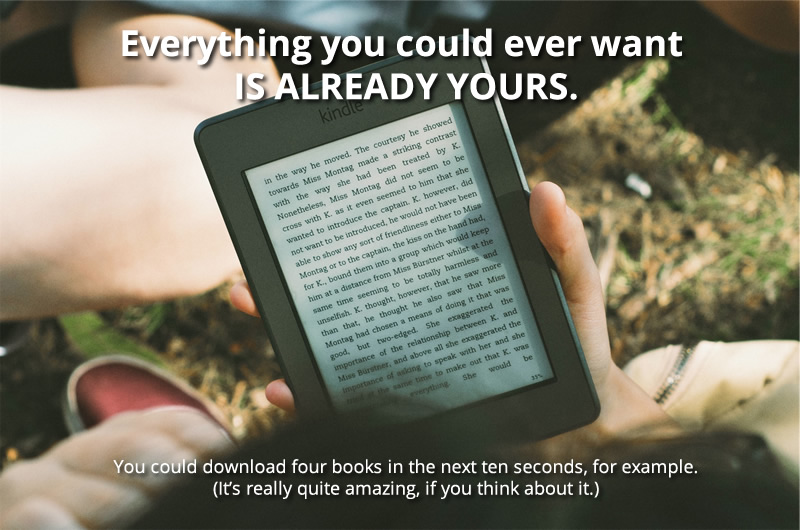Years ago I read a blog post that blew my mind. I wish with all my heart that I remembered the brilliant human who first shared this thought with me (and if it rings a bell, please tell me in the comments!)
It was a discussion…on Reddit, maybe?…about stuff. Having possessions. Having too many possessions. Wanting new possessions. Wanting that possession.
The statement from this one brilliant human that turned the entire conversation (and cemented itself forever like a tiny handprint in my memory) was this*:
I act like everything is already mine.
Everything. In the whole wide world. Any possession I could ever want, is mine. I just have to pay a fee to get it out of “storage”, to put it into my immediate possession.
Picture yourself at the grocery store. All of it is already yours. Every block of cheese, every frozen pizza, every chocolate bar, every ripe and juicy peach. Yours for the taking…you just have to decide which ones you want to bring home with you. Pay your fee to the storage facility on your way out the door.

And in a way, this is completely true. When you walk into any store, you have the potential to get any item. If you want a pair of Hunter rain boots, you can have them. If you want a wardrobe made only of J Crew apparel, you can accomplish that, too. If you want that Cadillac of Couches you’ve been eyeing up at Macy’s, you can have that too…but when it costs twice as much as your rent, you’ll need to decide what you want more, the apartment or the couch to put in it.
And here, we introduce the much-needed constraints into the equation. I have a limited capacity for consumption. I can buy all the ripe and juicy peaches, but my husband and I can only eat so many. It wouldn’t help us to have more than we can eat, and it would introduce new problems. Like fruit flies, for one.
Just as there is such a thing as too many peaches, there is such a thing as too much expensive furniture. You can have the couch—it’s already yours, after all—but when you realize you’d have to give up the roof over your head to get it, you realize that particular possession can sit a little while longer in storage, because you really like your sweet apartment with the gorgeous view, and the couch you got from your parents will get the job done for now.
It’s the difference between being the master of possessions and allowing them to master over you. It’s easy to fall into the line of thought that possessions out of your reach are teasing and taunting you. But when you realize you’re calling the shots, you’re choosing whether to have them in your possession or not…the string loosens. The desperate yearning to acquire begins to evaporate.
When you believe everything is already yours, the question is no longer about scarcity and acquisition. It becomes about logistics—how much do I need, and how much do I have the capacity to store and use? What exactly do I want? How much is too much?
It’s easier to let go of possessions, too, when you remember that the pile of books you’re donating are still yours…you’re just putting them back in storage. You can get any one of them back later, if you need it. There will always be enough of what you need.
Sustainability. Stewardship. Having just enough, but not too much. Only that which is beautiful, loved and useful to me, right at this moment.
And the magic part? This, quite fortunately, is where the altruistic self you truly want to be intersects with the self-interested being you know you also are. They can coexist, when you look at things in just the right way.
Beautiful, right?
// image by James Tarbotten via Unsplash
*This is all paraphrasing. If I remembered this wise soul’s actual words, I could just Google it and solve the whole sourcing problem.